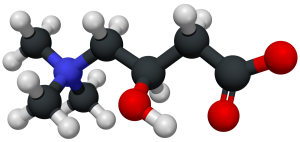Enhanced amino acid L-carnitine L-tartrate may facilitate post workout muscle recovery.

- Improving post workout recovery. Supplementing with L-carnitine L-tartrate may attenuate muscle damage and soreness.
- Maintaining muscle function. L-carnitine L-tartrate has been shown to increase levels of HDL.
Overview
L-tartrate is a salt (or ester) of tartaric acid that is often combined with other organic compounds in order to enhance their absorption. L-carnitine is an amino acid that is naturally produced by the human body. Despite its easy accessibility in animal-based foods and other high-protein nutrition, L-carnitine is frequently taken as a supplement to improve energy metabolism, burn fat, and even boost testosterone.
Recently, L-carnitine has been combined with L-tartrate in a formula known as L-carnitine L-tartrate (LCLT) as a way to protect muscles from the threat of post workout muscle damage and oxidative stress. LCLT supplementation has been shown to be safe to use in medical science research, but its true effectiveness in muscle recovery is still being investigated.1
How L-Carnitine L-Tartrate Might Help Post-Workout Formulas
Minimizing muscle damage
Although the precise mechanism is still unknown, L-carnitine L-tartrate has been shown to assist muscle recovery on 3 principal fronts:
- Reducing purine and protein catabolism, as indicated by lower levels of hypoxanthine, xanthine oxidase, uric acid, myoglobin, fatty acid-binding protein, and creatine kinase post workout.
- Protecting against oxidative stress, specifically that caused by malondialdehyde.
- Attenuating muscle disruption by over 40%.
Increasing high-density lipoprotein
L-carnitine L-tartrate was found to increase levels of high-density lipoprotein (HDL) — often referred to as “good” cholesterol and known to help maintain the function of skeletal muscles2 — as well as reduce levels of low-density lipoprotein (LDL), which has been associated with various health complications.
L-Carnitine L-Tartrate Post-Workout Benefits & Uses
L-carnitine L-tartrate may benefit post workout formulas by reducing muscle damage and soreness, according to multiple clinical studies. A distinct advantage of supplementing with LCLT is that, though it may not necessarily provide boosts in muscle growth, it does not appear to interfere with workout muscle protein synthesis either, the way many natural antioxidants do.
Further, numerous studies have identified the potential of L-carnitine to improve athletic performance during both aerobic and anaerobic exercises, bodybuilding included.3 This, along with L-carnitine L-tartrate’s ability to increase concentrations of insulin-like growth factor-binding protein-3 (IGFBP-3), has misleadingly encouraged athletes to abuse LCLT as a pseudo pre or post workout testosterone booster.4
| Food | Serving | Carnitine (milligrams) |
| Beef steak | 4 ounces | 56 – 162 |
| Ground beef | 4 ounces | 87 – 99 |
| Whole milk | 1 cup | 8 |
| Codfish | 4 ounces | 4 – 7 |
| Chicken breast | 4 ounces | 3 – 5 |

Research
Human Research
Several clinical studies have reported the capacity of L-carnitine L-tartrate to assist post workout muscle recovery. An important caveat to note is that all of the research suggesting L-carnitine L-tartrate supplementation improves muscle recovery were financially backed by supplement manufacturing companies.
L-carnitine L-tartrate (2 g) may facilitate post workout muscle recovery
In this placebo-controlled investigation, 10 trained men took either a placebo or 2 g of l-carnitine l-tartrate (LCLT) for 3 weeks while on a regular squat protocol. Exercise-induced markers of muscle breakdown and oxidation, including hypoxanthine, myoglobin, and malondialdehyde, were significantly attenuated in the LCLT group compared to the placebo. Overall muscle disruption was 41 – 45% less in the LCLT group compared to the placebo.
- The researchers concluded that “LCLT supplementation is effective in assisting recovery from high-repetition squat exercise.”5
L-carnitine L-tartrate (2 g) may improve post workout recovery
In this placebo-controlled investigation, 10 men were given either a placebo or 2 g of l-carnitine l-tartrate for 3 weeks while on a resistance training regimen. LCLT was found to reduce the amount of exercise-induced damage to muscle tissue and significantly increase concentrations of the muscle growth factor insulin-like growth factor-binding protein-3 (IGFBP-3) compared to the placebo.
- The researchers concluded that “These data support the use of LCLT as a recovery supplement for hypoxic exercise and… may help to mediate quicker recovery.”6
L-carnitine L-tartrate (2 g) may attenuate muscle hypoxia in resistance trained men
In this randomized, double-blind, placebo-controlled investigation, 9 resistance-trained men who performed squat exercises were given either a placebo or 2 g of L-carnitine L-tartrate for 23 days. The LCLT group had reduced levels of the muscle damage marker malondealdehyde.
- The researchers concluded that “hypoxic stress was attenuated with LCLT supplementation.”7
L-carnitine L-tartrate (3 g) may improve cholesterol levels after exercise
In this single-blind, placebo-controlled investigation, 20 elite male wrestlers were given either a placebo or 3 g of L-carnitine L-tartrate dissolved in 200 mL of water while on an exercise program. LCLT was demonstrated a significant positive correlation with a rise in high-density lipoprotein (HDL) and a loss in low-density lipoprotein (LDL) after exhaustive aerobic activity.
- The researchers concluded that “acute supplementation with LCLT tartrate increased HDL and decreased LDL, while not affected VLDL following an exhaustive aerobic activity.”8

L-carnitine L-tartrate (3 g) may increase post workout carbohydrate oxidation in males
In this randomized, double-blind, placebo-controlled investigation, 12 adults performed 60 min of exercise on 3 separate days and were given either a placebo or L-carnitine L-tartrate. A significant increase in carbohydrate oxidation was noted in males who took LCLT compared to the placebo. No significant effect was reported in the female participants.
- The researchers concluded that “chronic LCLT supplementation increased CHO oxidation in males during exercise.”9
L-carnitine L-tartrate (2 g) may increase the activity of testosterone receptors
In this randomized, placebo-controlled investigation, 10 trained men were administered either 2 g of L-carnitine L-tartrate or a placebo every day for 21 days while engaged in a regular resistance exercise (RE) protocol. LCLT was found to increase the number of active androgen receptors (AR), which bind to testosterone and dihydrotestosterone, compared to baseline and placebo. Testosterone concentrations were unchanged, but luteinizing hormone demonstrated significant changes after LCLT supplementation.
- The researchers concluded that “LCLT supplementation upregulated AR content, which may promote recovery from RE.”10
Post-Workout Dosage
- Successful clinical research studies use from 2 – 3 g of L-carnitine L-tartrate daily.
- Typical supplements range from 300 – 500 mg of L-carnitine L-tartrate per day. Allmax and Evlution are 2 of the most popular brands.
Available Forms
- Powder dissolved in water
- Capsules or tablets
Supplements in Review Says
- L-carnitine L-tartrate 2 g as part of a post-workout formula.
L-carnitine L-tartrate may benefit muscle recovery. L-carnitine L-tartrate has been shown to improve muscle recovery, specifically by reducing muscle damage and soreness. Since more than enough is ingested in a standard meal, LCLT should really only be used as a supplement by those who do not consume or naturally produce sufficient quantities of carnitine.
Try 2 g of L-carnitine L-tartrate. Most supplement reviews suggest starting with a 500 mg daily dose of L-carnitine L-tartrate, although up to 3 grams may be safe and effective according to clinical research. We recommend aiming for 2 g for optimal post workout recovery.
Leave a Reply